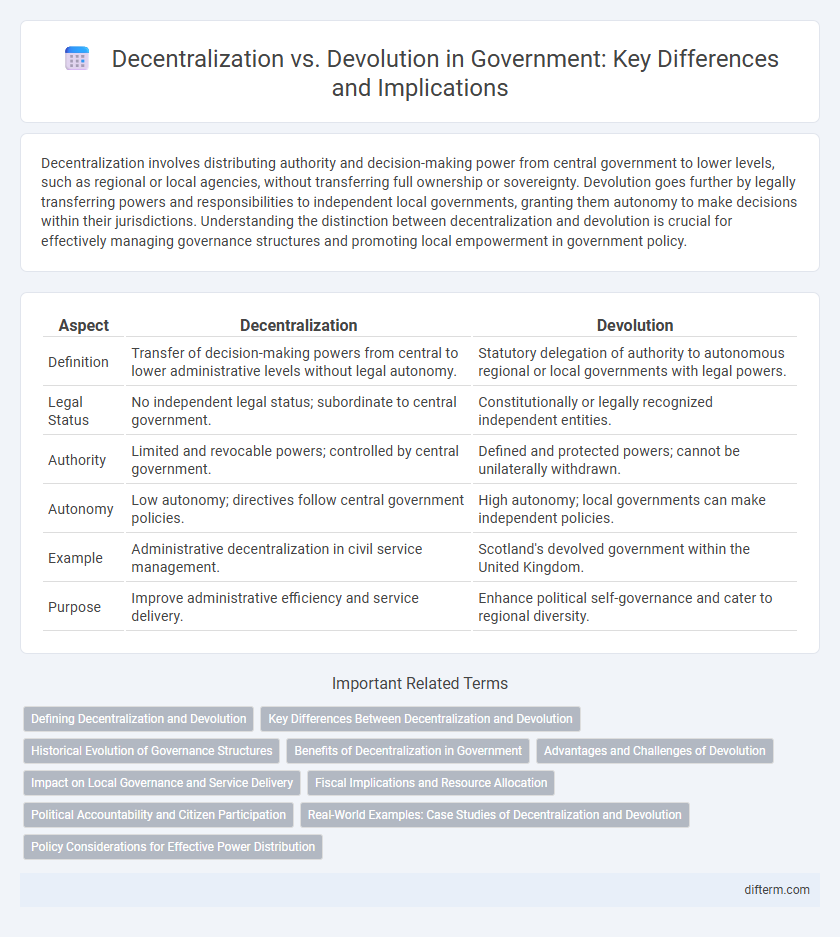Decentralization involves distributing authority and decision-making power from central government to lower levels, such as regional or local agencies, without transferring full ownership or sovereignty. Devolution goes further by legally transferring powers and responsibilities to independent local governments, granting them autonomy to make decisions within their jurisdictions. Understanding the distinction between decentralization and devolution is crucial for effectively managing governance structures and promoting local empowerment in government policy.
Table of Comparison
| Aspect | Decentralization | Devolution |
|---|---|---|
| Definition | Transfer of decision-making powers from central to lower administrative levels without legal autonomy. | Statutory delegation of authority to autonomous regional or local governments with legal powers. |
| Legal Status | No independent legal status; subordinate to central government. | Constitutionally or legally recognized independent entities. |
| Authority | Limited and revocable powers; controlled by central government. | Defined and protected powers; cannot be unilaterally withdrawn. |
| Autonomy | Low autonomy; directives follow central government policies. | High autonomy; local governments can make independent policies. |
| Example | Administrative decentralization in civil service management. | Scotland's devolved government within the United Kingdom. |
| Purpose | Improve administrative efficiency and service delivery. | Enhance political self-governance and cater to regional diversity. |
Defining Decentralization and Devolution
Decentralization refers to the transfer of decision-making powers and administrative responsibilities from central government to lower levels of government or local authorities, aiming to improve governance efficiency and local accountability. Devolution is a specific form of decentralization where powers granted to subnational governments are constitutionally or legally protected, allowing them autonomous decision-making authority in areas such as education, health, and transportation. While decentralization can be flexible and partially reversible, devolution establishes legally binding frameworks that guarantee subnational governments' independence in managing devolved functions.
Key Differences Between Decentralization and Devolution
Decentralization involves the transfer of decision-making powers and administrative responsibilities from central government to lower levels or agencies, while devolution grants autonomous powers to subnational governments with constitutionally recognized authority. A key difference lies in the degree of autonomy; devolution provides permanent self-governance to local entities, whereas decentralization often remains reversible and controlled by the central government. The legal and political framework in devolution ensures local governments operate independently, contrasting with decentralization's limited delegation within a unitary state.
Historical Evolution of Governance Structures
Decentralization refers to the transfer of decision-making powers from central to local governments while maintaining ultimate control at the center, whereas devolution involves granting autonomous powers to subnational units with constitutional authority. Historically, governance structures evolved from highly centralized monarchies to more complex federal systems, reflecting shifts toward increased local autonomy and participatory governance. Notable examples include the devolution acts in the United Kingdom during the late 20th century, which established legislative bodies in Scotland, Wales, and Northern Ireland, marking significant milestones in modern decentralized governance.
Benefits of Decentralization in Government
Decentralization in government enhances administrative efficiency by distributing decision-making authority to local levels, allowing for more responsive and tailored public services. It promotes increased citizen participation and accountability, fostering transparency and trust between the government and its constituents. Economic development is also stimulated as local governments can address region-specific needs and allocate resources more effectively.
Advantages and Challenges of Devolution
Devolution grants regional governments greater autonomy, enabling tailored policy-making that addresses local needs, enhances democratic participation, and improves resource allocation efficiency. It fosters accountability by bringing decision-makers closer to the electorate, yet challenges include potential disparities in regional capacities, risk of fragmented national policies, and the complexity of managing intergovernmental relations. Effective devolution requires clear legal frameworks and strong institutional support to balance local independence with national unity.
Impact on Local Governance and Service Delivery
Decentralization redistributes decision-making authority from central to local governments, enabling tailored policy implementation that better addresses community needs and improves public service efficiency. Devolution grants greater autonomy to local governments, fostering accountability and empowering local officials to manage resources and services independently. Both processes enhance local governance by promoting citizen participation, but devolution typically leads to more significant improvements in service delivery through increased local control and responsiveness.
Fiscal Implications and Resource Allocation
Decentralization transfers decision-making authority to lower levels of government, enhancing local fiscal autonomy but often requiring complex intergovernmental fiscal transfers to balance disparities. Devolution grants constitutional powers and financial independence to subnational governments, promoting accountability but potentially causing uneven resource allocation due to varied local revenue capacities. Effective fiscal decentralization mechanisms and equitable resource distribution frameworks are crucial to ensuring sustainable public service delivery and fiscal stability across all government tiers.
Political Accountability and Citizen Participation
Decentralization distributes authority across various government levels, enhancing political accountability by creating multiple points of oversight and increasing citizen participation through broader access to decision-making processes. Devolution grants substantial autonomous power to local governments, fostering direct accountability as citizens hold local officials responsible for specific policy outcomes. Both approaches strengthen democratic governance, with decentralization promoting shared responsibility and devolution empowering localized self-governance.
Real-World Examples: Case Studies of Decentralization and Devolution
Decentralization in Uganda demonstrates how transferring authority to regional governments enhances local service delivery, while devolution in the United Kingdom allocates legislative powers to Scotland, Wales, and Northern Ireland, fostering regional autonomy within a unitary state. In Brazil, decentralization has enabled municipalities to manage education and health services directly, highlighting improved responsiveness to local needs. Conversely, Spain's devolution model grants Catalonia and the Basque Country significant self-governing powers, illustrating the political and cultural dimensions embedded in devolved governance.
Policy Considerations for Effective Power Distribution
Effective power distribution in government requires clear distinctions between decentralization and devolution, where decentralization redistributes administrative responsibilities without transferring authority, while devolution grants autonomous powers to local governments. Policy considerations must ensure legal frameworks support local decision-making, fiscal autonomy, and accountability mechanisms to prevent fragmentation or power imbalances. Emphasizing capacity building and stakeholder engagement enhances governance quality and promotes sustainable development outcomes across regions.
decentralization vs devolution Infographic

 difterm.com
difterm.com